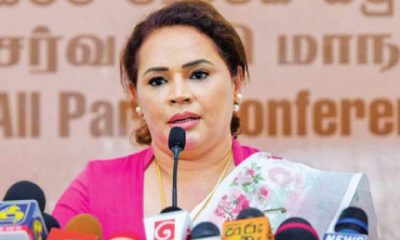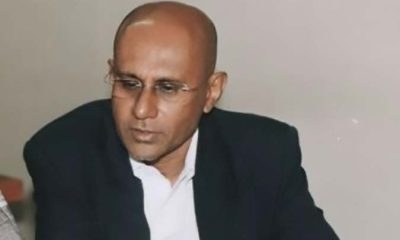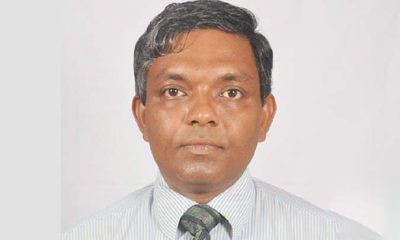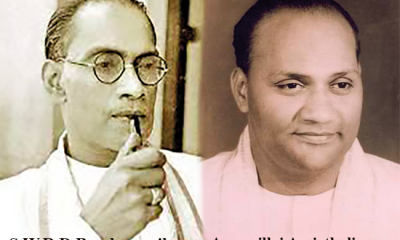News
UNDP report on vulnerability factors handed over to govt.
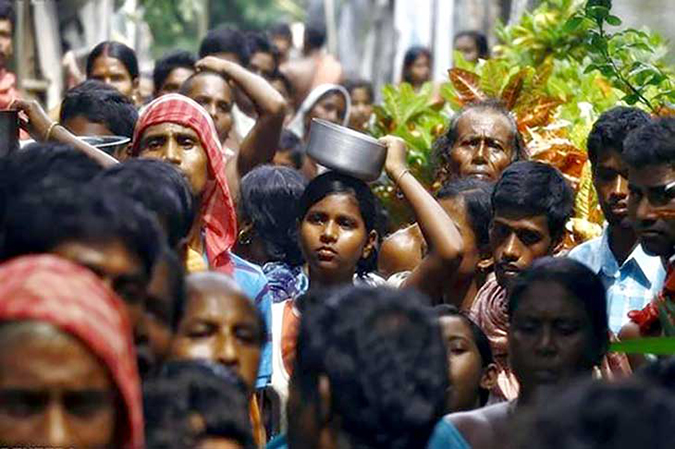
Debt, a lack of education, and the ability to adapt to disasters are factors that make most Sri Lankans feel vulnerable, says a new report, released yesterday (01 Sept.) by the United Nations Development Programme (UNDP) and the University of Oxford’s Poverty and Human Development Initiative (OPHI).
The Policy Report, titled ‘Understanding Multidimensional Vulnerabilities: Impact on People of Sri Lanka’ puts forth Sri Lanka’s first ever Multidimensional Vulnerability Index (MVI), which was derived using the National Citizen Survey (NCS) 2022-23 covering a representative sample of 25,000 households. The survey was conducted between November 2022 and March 2023 to capture the impact of the cascading crises on the people.
It demonstrates the overlapping challenges faced by Sri Lanka’s population and weaves together a novel set of indicators to capture vulnerabilities beyond traditional income-based measures.
The index includes 12 indicators, grouped under three dimensions: education, health and disasters, and living standards. Indicator selection was based on consultations with key stakeholders, including a technical advisory panel. The collaborative engagement process ensured that the MVI would appropriately reflect the complexity of vulnerabilities experienced by individuals and groups across Sri Lanka.
The national results of the MVI indicate that the key factors that impact vulnerability include household indebtedness, largely due to pawning items to purchase essential goods; years of schooling, disaggregated by gender; and adaptive capacity to disasters. In addition to these, working in informal jobs also makes individuals more vulnerable.
Commenting on the report, PM Dinesh Gunawardena said that it comes at a crucial time for Sri Lanka. “Given recent events, it is timely that the first Multidimensional Vulnerability Index (MVI) is developed for Sri Lanka, to ensure that those at the helm of policymaking will continue to be equipped with the information they need to determine where help is most needed.
“Therefore, I thank the team that has worked on this report and in developing the National Citizen Survey and the MVI for taking the initiative to do so, and I encourage all decision-makers, in the relevant Government institutions, as well as the private sector and civil society, to use this analysis to first understand and then implement measures to help move Sri Lanka away from vulnerability in the future.”
Dr. Sabina Alkire, Director, Oxford Poverty and Human Development Initiative (OPHI), University of Oxford, observed: “The MVI sheds light on the complex landscape of vulnerability in Sri Lanka, where 55.7 percent of the population, or 12.3 million people, experience multidimensionally vulnerability. Focused interventions, such as reducing indebtedness or enhancing disaster preparedness, are vital to build resilience. This exploratory MVI expands on Sri Lanka’s official Multidimensional Poverty Index by using 2022/23 citizen survey data and including a distinct tapestry of vulnerabilities.”
Highlighting the importance of the report, Ms. Azusa Kubota, UNDP Sri Lanka Resident Representative, said: “Amidst a rapidly shrinking fiscal space, deepening the understanding of these diverse experiences and vulnerabilities is an important first step towards designing impactful policy and programme interventions. The report’s findings have far reaching policy and programme implications as Sri Lanka embarks on a series of interventions to ensure sustainable, inclusive and green recovery pathways from the crises. We hope this report will influence and shape policies and interventions that prioritize the needs of vulnerable communities.”
Several districts, including Puttalam, Batticaloa, Mullaitivu, Kilinochchi, Ampara, Vavuniya, and Nuwara Eliya, exhibit multidimensional vulnerability, highlighting the need for focused interventions to address factors, like disaster preparedness, debt relief, water source accessibility, and female education. Thus, a nuanced, well-designed and comprehensive policy approach is recommended to improve the wellbeing of these communities.
The MVI sheds light on the complexity of existing vulnerabilities – with overall results suggesting targeted efforts in areas like debt, disaster preparedness, water source accessibility, and female education, emphasizing the need for multisectoral engagement to enhance the well-being of vulnerable communities in Sri Lanka. Ensuring that such data is up-to-date and comprehensive is a crucial first step in addressing these challenges and maintaining progress towards a more equal world.
The MVI for Sri Lanka is identified as the first ever vulnerability index using Citizen Science. However, this study is not without its limitations. The report acknowledges this and advocates for the inclusion of further criteria and inclusion of the MVI as part of National Data collection exercises.
The NCS was initiated by UNDP Sri Lanka, in collaboration with the Citra Innovation Lab and UNDP’s SURGE Data Hub, to capture a snapshot of vulnerabilities experienced by Sri Lankans as a result of the pandemic and the economic crisis.
News
US sports envoys to Lanka to champion youth development

The U.S. Embassy in Colombo welcomed the U.S. Sports Envoys to Sri Lanka, former National Basketball Association (NBA) and Women’s National Basketball Association (WNBA) players Stephen Howard and Astou Ndiaye, from June 8 through 14.
The Public Diplomacy section of the U.S. Embassy said that it would launch a weeklong basketball program intended to harness the unifying power of sports, made possible through collaboration with Foundation of Goodness and IImpact Hoop Lab.
While in Sri Lanka, Howard and Ndiaye, both retired professional basketball players, will conduct a weeklong program, Hoops for Hope: Bridging Borders through Basketball. The Sports Envoys will lead basketball clinics and exhibition matches and engage in leadership sessions in Colombo and Southern Province for youth aged 14-18 from Northern, Uva, Eastern and Western Provinces, offering skills and leadership training both on and off the court. The U.S. Envoys will also share their expertise with the Sri Lanka Basketball Federation, national coaches, and players, furthering the development of basketball in the country. Beyond the clinics, they will collaborate with Sri Lankan schoolchildren to take part in a community service project in the Colombo area.
“We are so proud to welcome Stephen and Astou as our Sports Envoys to Sri Lanka, to build on the strong people-to-people connections between the United States and Sri Lanka,” said U.S. Ambassador Julie Chung. “The lessons that will be shared by our Sports Envoys – communication, teamwork, resilience, inclusion, and conflict resolution – are essential for leadership development, community building, equality, and peace. The U.S. Sports Envoy program is a testament to our belief that sports can be a powerful tool in promoting peace and unity.”
News
Rahuman questions sudden cancellation of leave of CEB employees

SJB Colombo District MP Mujibur Rahuman in parliament demanded to know from the government the reasons for CEB suspending the leave of all its employees until further notice from Thursday.
MP Rahuman said that the CEB has got an acting General Manager anew and the latter yesterday morning issued a circular suspending leave of all CEB employees with immediate effect until further notice.
“We demand that Minister Kanchana Wijesekera should explain this to the House. This circular was issued while this debate on the new Electricity Amendment Bill was pending. There are many who oppose this Bill. The Minister must tell parliament the reason for the urge to cancel the leave of CEB employees,” the MP said.However, Speaker Mahinda Yapa Abeywardena prevented Minister Wijesekera responding to the query and said that the matter raised by MP Rahuman was not relevant.
News
CIPM successfully concludes 8th Annual Symposium

The Chartered Institute of Personnel Management (CIPM) successfully concluded the 8th Annual CIPM Symposium, which took place on 31st May 2024. Themed “Nurturing the Human Element—Redefining HRM in a Rapidly Changing World,” the symposium underscored the pivotal role of human resource management (HRM) in today’s dynamic global landscape. Since its inception in 1959, CIPM has been dedicated to advancing the HR profession through education, professional development, and advocacy, solidifying its position as Sri Lanka’s leading professional body for HRM.
Ken Vijayakumar, the President of the CIPM, graced the occasion as the chief guest. The symposium commenced with the welcome address by the Chairperson, Prof. Arosha Adikaram, followed by the Web Launch of the Symposium Proceedings and Abstract Book by the CIPM President. The event featured distinguished addresses, including a speech by Chief Guest Ken Vijayakumar, President of CIPM, and an address by Guest of Honor Shakthi Ranatunga, Chief Operating Officer of MAS Holdings Pvt. Ltd., Sri Lanka.
The symposium also featured an inspiring keynote address by Prof. Mario Fernando, Professor of Management and Director of the Centre for Cross Cultural Management (CCCM) at the University of Wollongong, Australia.
Vote of Thanks of the inauguration session was delivered by Dr. Dillanjani Weeratunga, Symposium Co-chair.
The symposium served as a comprehensive platform for researchers to present their findings across a wide range of critical topics in HRM. These included Cultural Diversity and Inclusion, Talent Development and Retention, Ethical Leadership and Corporate Social Responsibility, Adapting to Technological Advancements, Mental Health and Well-being at Work, Global Workforce Challenges, Employee Empowerment, and Reskilling and Upskilling.
The plenary session was led by Prof. Wasantha Rajapakse. Certificates were awarded to the best paper presenters during the valedictory session, followed by a vote of thanks delivered by Kamani Perera, Manager of Research and Development.
The annual symposium of CIPM was a truly inclusive event, attracting a diverse audience that spanned undergraduates, graduates, working professionals, research scholars and lecturers. This widespread interest highlights the symposium’s significance in the field of HRM, offering a unique opportunity for everyone to network and learn from scholarly brains.The CIPM International Research Symposium was sponsored by Hambantota International Port, Sri Lanka Institute of Information Technology (SLIIT), E B Creasy & Co. PLC, and Print Xcel Company.


